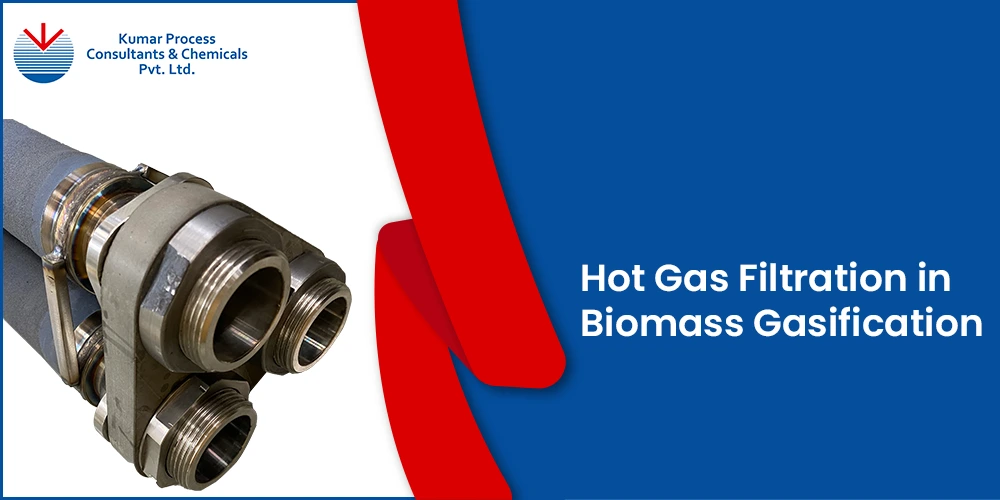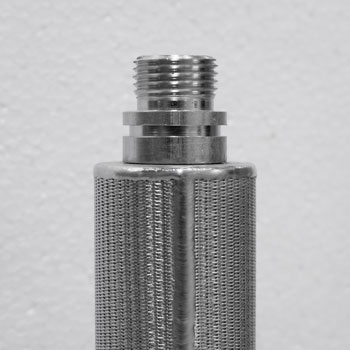


Biomass gasification is a proven technology that converts organic materials into syngas through a controlled process involving heat, steam, and oxygen. This syngas, composed mainly of carbon monoxide and hydrogen, is valuable for energy production and chemical synthesis. However, impurities like dust can reduce performance of a system and harm equipment.
Hot gas filtration plays a crucial role in removing these contaminants, improving gas quality, and increasing the efficiency of biomass gasification. Advanced filtration technologies, including filter candles and metallic filters, offer high-temperature resistance and durability, ensuring long-term operational functionality. Methods like catalytic filtration further enhance impurity removal, reducing maintenance costs and enabling cleaner energy production.
Hot gas filters are essential in the biomass gasification process to ensure the increased operational functionality of the filtration system. During gasification, biomass is converted into a combustible gas, or producer gas, which contains valuable components such as hydrogen (H₂) and carbon monoxide (CO). However, the process also generates impurities like particulate matter (PM), tars, sulfur compounds, and other contaminants. These impurities can cause severe issues such as fouling, erosion, and poisoning of downstream equipment, including turbines, internal combustion engines, catalysts, and fuel cells. Hot gas filtration solutions resolve these issues by operating at high temperatures to remove impurities before they condense or agglomerate to produce clean gas. The use of hot gas filtration systems not only enhances the reliability and durability of biomass gasifier systems but also ensures cleaner and more sustainable energy production.
Lets understand how hot gas filters produce the gas free from impurities like particulate matter, tars, and harmful chemical compounds in the biomass gasification process.
Below are the key steps involved in hot gas filtration:
The selection of filter media for hot gas filtration in biomass gasification depends on their ability to withstand high temperatures and chemically aggressive environments.
Common filter media used in biomass gasification process include:
Metallic filters, made from sintered metal powders or woven metallic mesh, are built to handle high temperatures, often up to 600°C. These filters are strong and stable, making them ideal for use in biomass gasifiers. Filters made from materials like Hastelloy® are non-flammable and resistant to smoldering particles, ensuring a safer and more reliable filtration process. We also offer filters made from an iron-aluminum alloy. This material forms a ceramic-like coating when exposed to hot gas, giving it excellent resistance to corrosion. Unlike ceramic filters, these filters are more flexible and less likely to break, making them easier to install and maintain.

Catalyst filter media are mainly used in biomass gasification by capturing particulates while enabling chemical reactions that break down tars and other contaminants. These filters enhance syngas quality and improve overall process efficiency. Common catalysts used in hot gas filters include nickel-based, dolomite, and activated metal oxides, which are selected based on gasifier conditions and target pollutants. Integrating catalytic filter media ensures cleaner syngas production and enhances the sustainability of biomass gasification.

Lets understand the hot gas cleaning in the biomass gasification process, ensuring that the producer gas is free from impurities like particulate matter, tars, and harmful chemical compounds. Below are the key aspects of the hot gas cleaning process:
The biomass gasification process occurs in four key stages:
1. Drying – Moisture is removed from biomass at 100–200°C.
2. Pyrolysis – Biomass decomposes into gases, tar, and char at 200–700°C.
3. Combustion – Partial oxidation generates heat and produces CO₂ and H₂O at 700–1500°C.
4. Reduction/Gasification – Char reacts with CO₂, H₂O, and heat to produce syngas (CO, H₂, CH₄) at 700–1200°C.
Biomass gasification is a process that converts organic material (biomass) into syngas, a mixture of carbon monoxide, hydrogen, and methane, through partial combustion at high temperatures.
Biomass gasification occurs at high temperatures ranging from 700 to 1200°C, depending on the process conditions and feedstock properties.
Biomass gasification produces syngas, mainly CO, H₂, and CO₂, with small amounts of CH₄ and trace gases like nitrogen, tar vapors, and sulfur compounds. Syngas composition varies based on biomass type, temperature, and gasifying agents. It is used for power, fuel, and chemical production.
The purpose of a hot gas filter in biomass gasification is to remove contaminants like particulates and tars, protecting equipment and ensuring clean producer gas for energy production or industrial use.
Biomass gasification achieves 70–80% efficiency, producing fuel gas with 30–55% N₂, 16–30% CO₂, 12–30% CO, and 2–10% H₂. Air-blown gasification generates 2 Nm³ of fuel gas per kg of dry biomass, making it a reliable energy source.